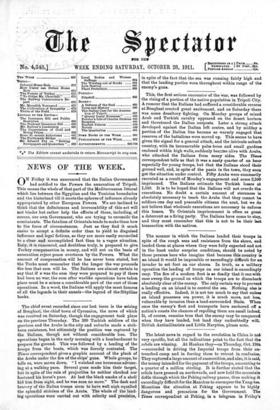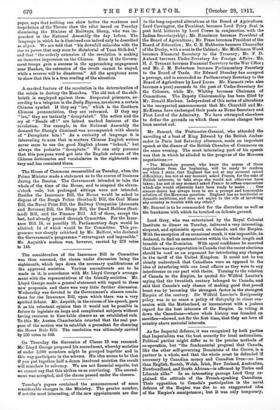The latest news in regard to the revolution in China
is not very specific, but all the indications point to the fact that the rebels are winning. At Hankau they—on Thursday, Oct. 19th —succeeded in driving the Imperial troops from their en- trenched camp and in forcing them to retreat in confusion. They captured a large amount of ammunition, and also, it is said, the money intended for the payment of the troops, amounting to a quarter of a million sterling. It is further stated that the rebels have pressed on northwards, and now hold the mountain defile through which the Peking railway passes, thus making it exceedingly difficult for the Manchus to reconquer the Yang-tee. Meantime the situation at Peking appears to be highly dangerous and precarious for the Government. The Times correspondent at Peking, in a telegram in Friday's
paper, says that nothing can show better the weakness and trepidation of the Throne than the edict issued on Tuesday dismissing the Minister of Railways, Sheng, who was im- peached in the National Assembly the day before. The language in which be is dismissed can indeed only be described as abject. We are told that "his downfall coincides with the rise to power that may soon be dictatorial of Yuan Shih-kai," and that "the orderly extension of the revolution is making an immense impression on the Chinese. Even if the Govern- ment troops gain a success in the approaching engagement near Hankau, the extension of the revolt cannot be stayed, while a reverse will be disastrous." All the symptoms seem to show that this is a true reading of the situation.











































